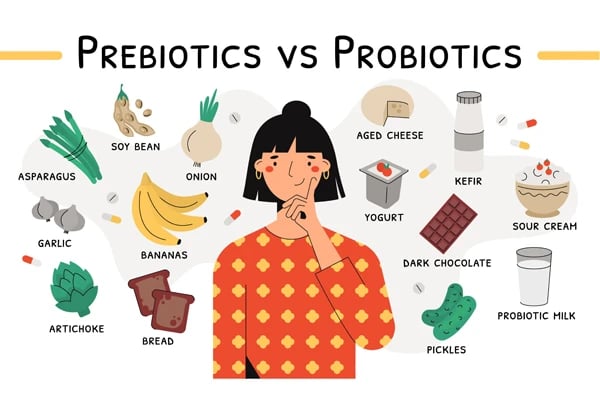The Role of Probiotics and Prebiotics in Digestive Health
Digestive health plays a crucial role in overall well-being. Many people are familiar with probiotics and prebiotics, but not everyone understands how essential these two elements are for a healthy digestive system. This article explores the roles of probiotics and prebiotics, their differences, and the types of foods that contain both to support your digestive health.
BODY HEALTHPROBIOTICS AND PREBIOTICSDIGESTIVE HEALTHNATURAL SOURCES OF PROBIOTICSHEALTHY LIFESTYLE
11/6/20242 min read


What Are Probiotics?
Probiotics are beneficial bacteria that promote health, particularly in the digestive system, often known as "good" bacteria. Probiotics can be found in foods such as yogurt, kefir, tempeh, kimchi, sauerkraut, and certain supplements in the form of drinks, capsules, or powders, such as Lactobacillus rhamnosus and Bifidobacterium bifidum. These bacteria work to replenish the population of good bacteria in the gut, which may be reduced due to poor diet, stress, or antibiotic use.
Research shows that regular consumption of probiotics can help reduce digestive disorders like diarrhea, constipation, and irritable bowel syndrome. Additionally, probiotics play a role in enhancing the immune system by stimulating the production of immune cells.
What Are Prebiotics?
Prebiotics, on the other hand, are actually very high fiber but human digestion is quite limited in utilizing these kinds of foods. Still, these fibers are crucial as they are the sources of food for the good bacteria in the body and thus nourishes them.
Prebiotics are present in plenty in foods that people consume on a daily basis for example, wheat and soybeans, vegetables like garlic and onions, leeks and asparagus as well as fruits such as bananas and apples.
So in brief, probiotics are the good bacteria, while prebiotics are the non-living substances which support their growth.
Key Benefits of Probiotics and Prebiotics for Digestion
Probiotics and prebiotics, collectively, are termed as ‘symbiosis’. Probiotics-prebiotics synergy is beneficial for gut management as both these ingredients are able to maintain the good bacterial population in the intestines. Some key advantages of using probiotics and prebiotics for digestive health include:
1. Relieves the digestive problems such as diarrhea and constipation.
2. Diminishes the intestinal inflammation symptoms.
3. Has an effect in reducing diarrhea following antibiotic usage.
4. Protects the health of the digestive tract.
5. Assists in the treatment of skin disorders, including eczema.
6. Safeguards kidney and vagina health.
7. Reduces the chances of acquiring allergies and cold or upper-respiratory tract infection.
8. Enhances the health of the teeth and the oral cavity.
In particular, the World Allergy Organization recommends probiotics to pregnant women, nursing mothers, and infants who are at a higher risk of developing allergies.
Other advantages of probiotics consist of enabling the defense of the digestive tract from bacteria, viruses, and fungus, promoting secretion of digestive enzymes, blocking colonization of cancer cells, and increasing immunity.
Why Combining Probiotics and Prebiotics Is Important
Balance is key to achieving optimal health. Consuming probiotics without prebiotics makes it harder for beneficial bacteria to grow and thrive. Conversely, prebiotics without probiotics is less effective since prebiotics needs probiotics to “feed” on to function fully. By combining both, you create an ideal environment for the good bacteria in your gut.
Digestive health is not just about avoiding harmful foods but also about adding nutrients that promote a balanced gut microbiome. Probiotics and prebiotics form the perfect combination for achieving this balance, working together to repair, maintain, and enhance your digestive health. By consuming foods rich in probiotics and prebiotics, you not only support gut health but also strengthen your immune system.
Invest in your digestive health by starting with simple steps: include more probiotic and prebiotic-rich foods in your daily diet. Your body will thank you in the long run!
